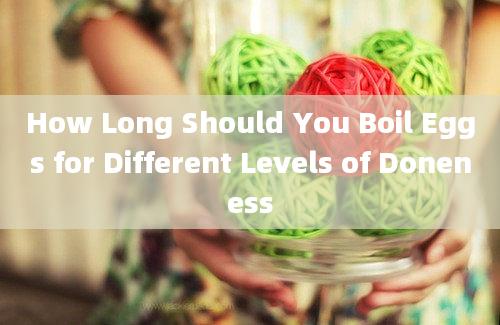Ideal Boiling Times for Eggs Whether Soft or Hard Boiled

Eggs are a versatile and nutritious food that can be prepared in various ways. One of the most popular methods is boiling, which can result in either softboiled or hardboiled eggs, depending on the boiling time. Understanding the ideal boiling times for different egg textures is crucial for achieving the perfect consistency. This article delves into the science behind boiling eggs and provides authoritative guidelines for achieving the desired outcome.
The Science of Boiling Eggs
Boiling eggs involves the denaturation of proteins within the egg. According to the American Egg Board, the white of an egg begins to coagulate at around 63掳C (145掳F), while the yolk starts to solidify at approximately 70掳C (158掳F) [^1^]. The time it takes for these proteins to fully coagulate determines whether the egg will be softboiled or hardboiled.
Ideal Boiling Times
1. SoftBoiled Eggs
3minute boil: The egg white is fully set, but the yolk is still runny.
5minute boil: The egg white is set, and the yolk is semiliquid.
7minute boil: The egg white is firm, and the yolk is soft but not runny.
2. HardBoiled Eggs
9minute boil: The yolk is fully set but still slightly soft in the center.
11minute boil: The yolk is completely solid with a pale yellow center.
13minute boil: The yolk is very firm and slightly grayish.
These times are based on large eggs brought to a rolling boil in a pot of water. It's important to note that factors such as egg size, altitude, and the initial temperature of the eggs can affect boiling times.
Tips for Perfect Boiling
Start with cold eggs: Placing eggs in cold water and then bringing them to a boil helps prevent cracking.
Use a timer: Precision is key, so always use a timer to ensure consistent results.
Peeling hardboiled eggs: For easier peeling, immediately place the eggs in an ice bath after boiling.
Sources
[American Egg Board](https://www.incredibleegg.org/)
Frequently Asked Questions (FAQs)
Q1: How long should I boil eggs for a runny yolk?
A1: For a runny yolk, boil large eggs for about 3 minutes. This will result in a fully set egg white with a completely runny yolk.
Q2: What is the ideal boil time for a softboiled egg with a semiliquid yolk?
A2: Boil large eggs for 5 minutes to achieve a softboiled egg with a semiliquid yolk.
Q3: How do I make a softboiled egg with a soft but not runny yolk?
A3: Boil large eggs for 7 minutes to get a softboiled egg with a yolk that is soft but not runny.
Q4: What is the recommended time for a hardboiled egg with a slightly soft center?
A4: For a hardboiled egg with a slightly soft center, boil large eggs for 9 minutes.
Q5: How long should I boil eggs for a fully set but pale yellow yolk?
A5: Boil large eggs for 11 minutes to achieve a fully set yolk that is still pale yellow.
Q6: What is the boil time for a very firm, slightly grayish yolk?
A6: Boil large eggs for 13 minutes to get a very firm yolk that may be slightly grayish.
Q7: Does the size of the egg affect boiling times?
A7: Yes, the size of the egg can affect boiling times. Larger eggs may require a minute or two longer, while smaller eggs may need less time.
Q8: How does altitude impact egg boiling times?
A8: At higher altitudes, water boils at a lower temperature, which can extend boiling times. You may need to add a few extra minutes to achieve the desired egg consistency.
Q9: Should I start with cold or hot water for boiling eggs?
A9: It's best to start with cold water. Placing eggs in cold water and then bringing them to a boil helps prevent cracking and ensures even cooking.
Q10: How can I make hardboiled eggs easier to peel?
A10: After boiling, immediately place the eggs in an ice bath. This rapid cooling helps the egg whites contract, making the eggs easier to peel.
[^1^]: [American Egg Board](https://www.incredibleegg.org/)









